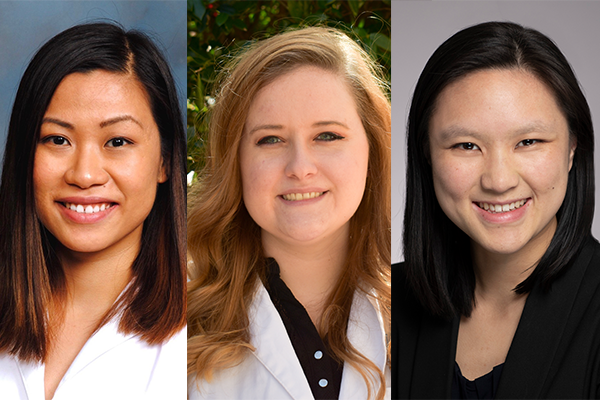Whole Community Health program unites students to break down economic barriers in two NC counties
The UNC Eshelman School of Pharmacy joins other UNC Schools to break down economic barriers in North Carolina.
by Brittany Jennings, UNC Pharmacy · July 10, 2020

Sisi Tran (left), Emily Meggs and Stephanie Hwang.
The WCH program seeks to document barriers to economic participation in Robeson and Edgecombe Counties – two eastern N.C. communities that have not shared in the state’s population growth over the past two decades, said Phil Rodgers, director of Interprofessional Education and Practice at the School of Pharmacy. Whole Community Health will work to identify specific local government policies, regulations, practices and procedures that constitute barriers to economic participation for women, people of color, and veterans, as well as justice-involved, LGBTQ, and disabled individuals.
The group will analyze barriers that may exist in the following policy and regulatory domains, which include: hiring, retention, and promotion; contracting and procurement; land use and zoning; workforce participation; housing and community development; economic development; personal safety and security; neighborhood stabilization; commercial stabilization; transportation and mobility; workforce needs; and policy implications.
“This program is a great way to engage our enthusiastic and creative students to identify and propose resolutions for these communities in need. Especially now, in light of the current unrest stimulated by inequities in society, these students can play an important role in finding solutions. The work is enhanced by the interprofessional perspectives that these students bring, to investigate the issues through different lenses, and help to make the communities better together,” said Rodgers, Pharm.D.
Participants from the School of Pharmacy include third year Pharm.D. students Sisi Tran, Emily Meggs and Stephanie Hwang,
The three pharmacy students will be part of an interdisciplinary team of students who will conduct the foundational research of the WCH project. Students from the health professions will be paired in teams with students from the Kenan-Flagler Business School and UNC School of Law to tackle research projects together.
“I am excited to learn and work alongside students from the UNC Kenan-Flagler Business School, UNC School of Law, the UNC Gillings School of Global Public Health, and UNC School of Medicine,” Hwang said. “By collaborating in a team with different ideas, experiences, and backgrounds, we can utilize each member’s talents to tackle real-world problems in a meaningful and impactful way.”
Based on the identification and analysis of barriers, the second goal will be to propose enabling policies, regulations, and practices that ensure more inclusive and equitable economic participation for identified individuals and groups in Robeson and Edgecombe Counties.
“There is a growing awareness that the well-being and health outcomes of a community are linked to the policies and practices that shape access to safe affordable housing, healthy food and investment opportunity,” Tran said. “Through this program, first, I hope to identify how the existing policies have created inequality. I want to find solutions to leverage the communities’ assets to improve neighborhood and commercial stabilization in hope of addressing the economic and social factors of the social determinants of health.”
Due to COVID-19 restrictions, research is taking place remotely and group gatherings are being held via Zoom.
In addition to the completion of the needs assessment, students will participate in regular seminars with faculty from each of the participating schools. This will allow students to combine their data and form a ‘whole community’ mindset, while also allowing students to learn about the unique ways that each profession can address whole community health through system change.
“I am most looking forward to working with other professional students and faculty to fill in the gaps in my knowledge as well as broaden my understanding of the various problems plaguing rural North Carolina,” Meggs said.
Hwang added that she hopes her team can develop feasible solutions to underlying barriers in the community. “In the end, if we are able to change at least one person’s life for the better, it would all be worth it,” she said.
